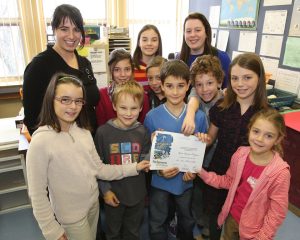Les Parlements au primaire et au secondaire sont une activité très populaire dans les écoles du Québec. Cette simulation à l’échelle de l’école a une réelle valeur d’éducation à la citoyenneté et place les jeunes directement au cœur des choix de la vie scolaire.
Les Parlements au primaire et au secondaire, instaurés par la Fondation Jean-Charles-Bonenfant de l’Assemblée nationale du Québec, visent à encourager la participation des élèves aux décisions touchant la vie de leur école tout en leur permettant d’apprendre et de mettre en pratique des valeurs démocratiques. Ils suscitent l’enthousiasme partout au Québec. Avec plus de 600 écoles inscrites et 40 000 membres de conseils d’élèves directement rejoints depuis 2006, ces projets intégrateurs sont vite devenus une initiative marquante dans le monde de l’éducation.
En plus de rejoindre le domaine de l’univers social du programme de formation de l’école québécoise, les Parlements au primaire et au secondaire répondent aux objectifs du programme de services éducatifs complémentaires de vie scolaire. En s’impliquant dans leur conseil d’élèves, les jeunes se responsabilisent et développent le sens de la citoyenneté, affirment leur sens moral, améliorent leurs relations interpersonnelles et augmentent leur sentiment d’appartenance à l’école.
Un soutien aux écoles
La Fondation Jean-Charles-Bonenfant de l’Assemblée nationale offre gratuitement à chaque école participante un soutien technique et professionnel donné par le coordonnateur des Parlements au primaire et au secondaire, dont des formations se déroulant à l’école. Des guides pédagogiques, des bracelets, des attestations, une affiche, un drapeau et une bannière sont aussi remis aux écoles inscrites. On peut en savoir plus en consultant cette page.
Visitez aussi les sites : Parlements au primaire et Parlements au secondaire
Quelques témoignages d’élèves
« J’en retire une grande satisfaction parce que j’ai l’impression que les élèves de mon école ont été représentés par une équipe de députés, de ministres et de responsables qui ont à cœur les intérêts de tous. Je retiens également que lorsque tout le monde travaille dans un même but, nous pouvons changer bien des choses. » Marc-André, élève, école Saint-Joseph (Mont-Laurier) – Commission scolaire Pierre-Neveu
« C’est amusant, parce que ça demande du travail d’organiser des élections. J’aimerais être élu, parce que j’aime les changements. » Lou-Félix, élève, école Mgr-Douville (Farnham) – Commission scolaire du Val-des-Cerfs
« C’est pour laisser des chances aux autres personnes et pour pas que ce soit toujours les mêmes qui décident des affaires. » Emmy, élève, l’école de St-Majorique (Gaspé) – Commission scolaire des Chic-Chocs
Et d’adultes!
D’après les témoignages obtenus, l’expérience des Parlements au primaire ou des Parlements au secondaire s’avère profitable.
« Le Parlement a été un élément motivant incroyable pour notre école. Monsieur le premier ministre est un excellent représentant et donne un nouveau souffle à notre conseil d’élèves. » Johanne Bédard, directrice de l’école du Parchemin (Carignan) – Commission scolaire des Patriotes
« À cause de la loi 56, les directions d’école où j’ai mis sur pied un Parlement étudiant ont déjà sollicité les élèves députés pour avoir leur contribution importante dans l’élaboration et la mise en place des moyens pour contrer l’intimidation. C’est génial, les élèves sentent qu’ils ont un rôle important à jouer, qu’ils peuvent faire la différence et qu’ils ont une responsabilité dans les moyens qui seront déployés pour éliminer l’intimidation dans leur école. C’est super, car un conseil étudiant peut faire beaucoup pour améliorer la vie des élèves à l’école, et je sens que les directions vont davantage les consulter ou les solliciter. » Isabelle Gagnon, animatrice de vie spirituelle et d’engagement communautaire, Commission scolaire des Grandes-Seigneuries
« Les débuts de notre Parlement au primaire sont plus qu’encourageants! En effet, après une campagne électorale enlevante (13 candidats dans notre petite école!), où les élèves ont pris à cœur de faire de super belles affiches et ont prononcé des discours enflammés, la journée des élections a aussi été une réussite. Les candidats élus et moi avons eu notre premier « dîner parlementaire » et avons élu notre premier ministre. Le conseil des ministres a aussi créé cinq ministères : le ministère de la Bougeotte (pour les sports), le ministère des 3R (Réduire, Recycler et Réutiliser), le ministère des Élèves cultivés, le ministère du Plaisir (pour les activités et sorties scolaires) et le ministère des A. S. (alimentation et santé). Comme vous voyez, ils sont très créatifs! » Nathalie Morin, enseignante à l’école Marie-Reine-des-Cœurs (Pohénégamook) – Commission scolaire du Fleuve-et-des-Lacs
« Depuis que le nouveau Parlement est installé, on remarque de grands changements dans les écoles. J’ai le sentiment que, soudainement, les élèves aiment l’école. Ils se sentent valorisés. Les jeunes de 1re secondaire se mêlent à ceux de 5e secondaire. La violence dans les corridors a beaucoup diminué. Je n’ai jamais vu des danses si populaires! » Steeve Loisel, animateur de vie spirituelle et d’engagement communautaire, polyvalente Mgr Sévigny (Chandler) – Commission scolaire René-Lévesque
Par Stéphane Lévesque et Audrey Miller





 Recevez l'Info #DevProf et l'Hebdo pour ne rien manquer des nouveautés de l'École branchée!
Recevez l'Info #DevProf et l'Hebdo pour ne rien manquer des nouveautés de l'École branchée!




